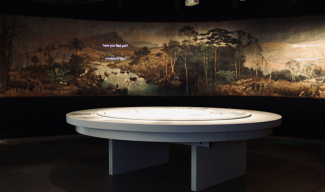
The Congo Panorama 1913. Colonial illusion exposed
What's hiding behind your screen?
Starting 28 November 2025ÖFFNUNGSZEITEN
- Öffnungszeiten:
Dienstag - Freitag: 10-17 Uhr
Wochenenden: 10-18 Uhr - Montag geschlossen und am 1. Januar, 1. Mai und 25. Dezember


Guided tours for individual visitors
Step back in time to 1913 and discover the Congo Panorama, a monumental work that captivated thousands of visitors at the Ghent World Exhibition.
MORE INFORMATION



